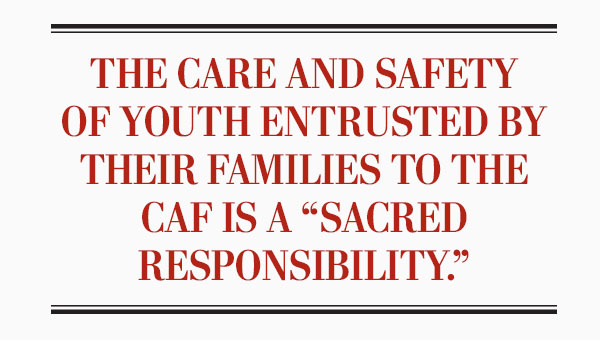
[Canadian Forces]
Cadets killed or seriously injured while participating in approved activities should have the same care and compensation that is extended to adults supervising them, the military ombudsman recommends.
“More needs to be done to support our most vulnerable participants of the cadet program,” said Canadian Armed Forces Ombudsman Gary Walbourne in a report to Defence Minister Harjit Sajjan.
He noted not much has changed in knowledge of, and access to, long-term care and compensation for cadets and their families since 1974, when six cadets were killed and dozens injured in a grenade demonstration at a summer cadet camp in Valcartier, Que.
The cadets, ineligible for benefits or compensation available to Forces members and defence employees, had to rely on provincial health plans. Families had to pay out of pocket for medical assistance not covered by provincial health plans, and if they couldn’t, the cadets went without. Few families knew where to go for help, or that they could file a claim against the Crown for additional compensation.
Complaints about unfair compensation for cadets in the decades following the incident sparked the ombudsman’s review of the cadet program in 2015.
Cadet activities differ from those of other youth programs in that the cadet organizations are under the control and supervision of the Canadian Armed Forces, though they are not part of the CAF. More than 20,000 youth, generally aged 12 through 18, attend summer training camps at 21 army, sea and air cadet training centres across the country. They are housed, fed and provided training activities at the expense and under supervision of the CAF. The care and safety of youth entrusted by their families to the CAF is a “sacred responsibility,” Lieutenant-General Guy Thibault, then vice-chief of the defence staff, said in media interviews. And, the ombudsman found, cadets are well supported by the CAF for short-term health-care access.

Yet, should something go seriously wrong, the report says, “today’s cadets are still excluded from a prescribed suite of compensation and benefits,” including disability payments, available to their [CAF] instructors, defence employees and some comparable groups. Cadets’ final recourse is still a legal claim against the Crown, just as in 1974.
An examination of insurance coverage revealed the maximum lump sum a Canadian cadet could receive through cadet league accident insurance for a life-changing or permanent impairment is $20,000, contrasted to $100,000 for severe injury for adult civil volunteers covered by the same policies; and the CAF Service Income Security Insurance Plan (SISIP) pays a maximum of $250,000 for CAF cadet instructor officers, who may also claim workers’ compensation.
The report’s major recommendation is that in event of illness or injury arising from an approved cadet activity, the Department of National Defence and CAF ensure cadets are compensated and supported in a manner commensurate with support and compensation available to CAF members.
Recognizing it may take time to change the necessary regulations and policies, the report recommends that prior to 2017 summer training, information be distributed so cadets, their families, instructors and supervisors all are well informed about what benefits cadets are entitled to now, and how to access them.
As part of the next annual review of cadet organization insurance policies, DND and CAF should ensure the benefits are identical for all cadet leagues.
“It is not fair to offer compensation and benefits to cadet instructors who become ill or injured as a result of a cadet activity, and not offer similar support to ill or injured cadets,” said the report.
Advertisement


















